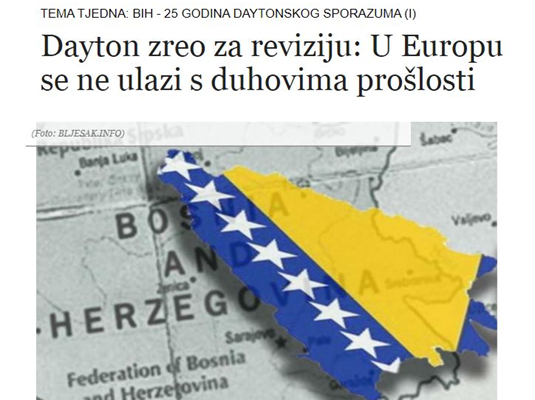Regarding the 25th anniversary of the Agreement, Picula said in the speech to the EP's Foreign Affairs Committee that it was not an anniversary to celebrate, but a warning to political leaders in Bosnia and Herzegovina.
Picula explained in the interview that despite the fact Dayton Agreement has met its initial purpose and ended the war and human suffering, at the same time it froze the existing state and created a complicated system of state, entity, federal and cantonal institutions that could not produce conditions necessary for state’s progress and prosperity for its citizens. Such status quo was used by political elites of all three nations and moreover it served as a kind of alibi for the international community for a passive attitude towards Bosnia and Herzegovina.
Picula therefore added: “Bosnia and Herzegovina still do not sufficiently respect the principles of equality, subsidiarity and federalism, necessary for that country to complete the transition to an effective and fully functioning state. These are solutions within which Croats as constituent people would have the opportunity to realize more of their interests in a united Bosnia and Herzegovina. Instead, Bosnia and Herzegovina continue to stagnate depriving it from social, economic and political reforms.”
This whole situation has led to an exodus of young people, however, recent election in Bosnia and Herzegovina have brought certain changes on which Picula commented: “It is also interesting that after recent local election, we saw a situation that in both the Federation and the Republika Srpska, the dominant parties lost part of their power in municipalities. The anti-corruption platform and anti-establishment rhetoric do not go hand in hand with tolerance and respect of human rights, and as a rule they only expose authoritarian appetites. Let me return to the part of the initial question - the warning. The departure of young people and people in the most productive years from Bosnia and Herzegovina is a direct consequence of inaction and maintaining such a status quo. Generations born in the period of the Dayton Agreement are today adults, some of which have already left their country, which is a true defeat for the state and the Bosnian society. The number of half a million people that emigrated from Bosnia and Herzegovina in the past seven years is simply horrifying. It should be noted that around 50 percent of young people want to leave Bosnia and Herzegovina while the birth rate in that country is the lowest in Europe. Almost all Bosnian politicians are to blame for such an exodus of Bosnian citizens, and we should not forget the responsibility of their political patrons from the sister parties in Serbia and Croatia.
Asked about Europe's ambitions in this context, Picula said that "the European Union is a strategic partner of Bosnia and Herzegovina, but progress depends primarily on communication between political actors in that country, because without a constructive agreement there will be no changes to the Agreement." However, an agreement that would seriously revise the current situation is not in the interest of many alleged veto-groups comfortably and lucratively located in the niches of Dayton.
When asked about the future of Bosnia and Herzegovina between Brussels and Dayton, and the benefits of membership in the European Union and NATO, Picula concluded: "NATO membership has clear rules and advantages in participating in the security umbrella, but it comes with demanding political reforms and financial commitments. I continuously emphasize the necessity of affirming European foreign policy in the Western Balkans, that is, the need for the EU to show that it is capable of solving problems in its immediate neighborhood. Only in this way can it be credible in far greater global challenges. From the perspective of the EU itself, enlargement policy has been its most successful tool in spreading its interests and stabilizing its neighborhood. Hardly any other tool can replace it in achieving these goals. Looking back, each new EU member has benefited vastly from joining that bloc. The availability of cohesion funds, access to a large market of almost half a billion people, freedom of movement, capital, goods and people, are all advantages that would be available to Bosnia and Herzegovina upon EU membership. But personally, I am extremely inclined to link the right to use EU funds with the rule of law for members, which is the subject of huge divisions between old members, net payers, and new ones, net receivers, whose authoritarian political leaders want to avoid it at all costs. I believe that the rule of law will continue to be a key theme of EU relations and a criterion for admitting new members, so it is clear that Bosnia and Herzegovina expects a lot of work or the continued exodus of all those not directly interested in political parties will prevail. Unfortunately, it is not yet clear how to replace Dayton with a system more appropriate to a complex community, which would be more effectively connected by its own differences. This is a time when almost all the institutions of the international community that are designed to implement the peace agreement and oversee the key processes of reconstruction and functioning of the country have failed. But some new institutions, primarily those to be formed to join the EU, are not yet operational. However, BiH has every right to its place in the European political architecture of the 21st century. What the country will be like depends on it alone for the most part. It would be ideal for BiH to confirm its European ambitions by internal harmonization of political relations, as the previously conflicting European states have succeeded in the framework of the EU project. Everything else will keep it at the European end. "


